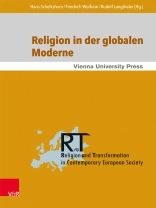Die jüngste Phase der Globalisierung birgt für die religiösen Traditionen in den verschiedenen Weltregionen enorme Herausforderungen. Die kommunikative Verdichtung der Weltgesellschaft verstärkt gegenseitige Infragestellungen. Durch Migration und transkulturelle Prozesse sind auch in Europa neue plurireligiöse Konstellationen entstanden. In fast allen Weltreligionen stehen sich heute fundamentalistische und modernitätsoffene religiöse Gruppen konfliktreich gegenüber. Vor diesem Hintergrund stellt sich für die europäische Religionsphilosophie mehr denn je die Aufgabe, den engeren Bereich der westlichen Moderne zu überschreiten, ohne ihre Errungenschaften leichtfertig aufzugeben.
The current process of globalization holds enormous challenges for religious traditions all over the world. The intensification of global communication through the new information technologies enhances mutual questioning of religious doctrines. Migration movements and transcultural processes created also in Europe new multi-religious constellations. Thus in all regions of global modernity the societal cohesion is threatened by conflicts between fundamentalist religious movements and various secular groups with religious, agnostic or atheistic orientations. At this background the European philosophy of religion has to transcend the narrow horizons of the western modernity without abandoning its achievements. This diagnosis of the current world situation determines the main parts of this volume. The first section deals with systematic approaches for an intercultural reorientation of the European philosophy of religion. The following sections contain distinguished studies of European philosophies of religion from Neoplatonism to Nietzsche and approaches of the 20th century (Maurice Merleau-Ponty, Albert Camus, Michel Henry). The last section is devoted to detailed interreligious studies, concretely about the thought of Ibn Rushd ( Averroes), of the modern Hindu thinker Sri Aurobindo and the ‘atheistic’ dimension of Buddhism.
Over de auteur
Prof. Dr. Dr. Hans Schelkshorn lehrt Philosophie am Institut für Christliche Philosophie der Katholisch-Theologischen Fakultät der Universität Wien.












